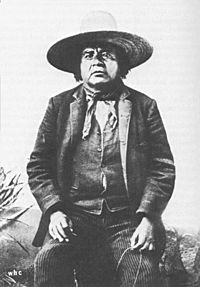Eskiminzin facts for kids
Quick facts for kids
Eskiminzin
|
|
|---|---|
| Eskiminzin "Men Stand in Line for Him" | |
 |
|
| Aravaipa Apache leader | |
| Personal details | |
| Born | 1828 near the Pinal Mountains, born as a Pinaleño Apache |
| Died | 1894 San Carlos Reservation |
| Known for | establishing the San Carlos Reservation |
Eskiminzin (whose name in the Western Apache language means "Men Stand in Line for Him") was an important leader of the Aravaipa band of the Western Apache people. He lived from about 1828 to 1894, during a time known as the Apache Wars.
Eskiminzin was known for wanting peace. He worked hard to find ways for his people to live peacefully with the new settlers.
Contents
Eskiminzin: A Leader for Peace
Eskiminzin was born around 1828 near the Pinal Mountains. He was originally part of the Pinaleño Apache group. When he married into the Aravaipa Apache, he became a member of their community. He soon became a respected leader, or chief, of the Aravaipa band.
His main goal was to create lasting peace. He wanted Native American people and the new settlers to live together without conflict.
Trying for Peace at Camp Grant
In 1871, Eskiminzin and his people were offered a chance for peace. The U.S. Government invited them to settle down. They were asked to plant crops near Camp Grant, Arizona, which was a fort close to modern-day Tucson, Arizona. Eskiminzin and other Apache leaders, like Capitán Chiquito, accepted this offer. They hoped it would bring a new era of peace.
The Camp Grant Attack
Sadly, this plan for peace did not last long. On April 30, 1871, a group of people attacked the settlement. This group included American civilians, Mexican civilians, and Tohono Oʼodham warriors. The attack happened without any warning.
This event became known as the Camp Grant massacre. Many people were killed, and some children were taken captive. They were later moved to Mexico. Eskiminzin was one of the few who survived this terrible event.
Later Life and Challenges
After the Camp Grant attack, Eskiminzin continued to face difficulties. Later in his life, he was suspected of helping his son-in-law, a man known as the Apache Kid. Because of this, Eskiminzin was put in prison without a trial.
He was eventually released from prison. However, the hardships he had faced had taken a toll on him. Eskiminzin passed away in 1894. He is remembered as a leader who always sought peace for his people.
 | Stephanie Wilson |
 | Charles Bolden |
 | Ronald McNair |
 | Frederick D. Gregory |

